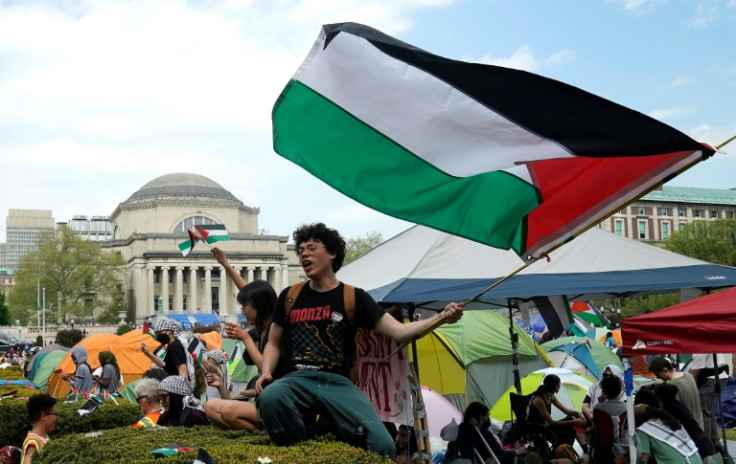Activists Occupy Columbia Building As US Campus Protests Flare

Demonstrators at Columbia University barricaded themselves inside a campus building early Tuesday, escalating a standoff with school officials as pro-Palestinian protests upend campuses across the United States.
The occupation of Hamilton Hall at the prestigious university in New York came hours after administrators said they had begun suspending students for failing to comply with an order to disperse.
Masked individuals smashed windows and moved metal tables to block the building's entrances, images shared overnight on social media showed.
"After 206 days of genocide and over 34,000 Palestinian martyrs, Columbia community members took back Hamilton Hall just after midnight," the group said in a statement citing Israel's war in Gaza.
It said the group had renamed the building "Hind's Hall" in honor of a six-year-old Gazan girl killed by Israel during its ongoing offensive against Hamas.
The demonstrators vowed to remain at the hall until their demands are met, including that Columbia divest all financial holdings linked to Israel.
The school has rejected the demand, with a statement Monday by university president Minouche Shafik saying talks with students "were not able to come to an agreement."
Protests have swept through higher education institutions from coast to coast, with many erecting tent encampments on campus grounds, after around 100 protesters were first arrested at Columbia on April 18.
At the University of North Carolina at Chapel Hill, police moved in Tuesday morning to clear one encampment, and could be seen in social media images detaining a few protesters.
TV footage showed police at the Virginia Commonwealth University (VCU) in Richmond on Tuesday evening pushing and shoving away protesters, with students saying teargas and pepper spray was deployed.
At the University of Texas at Austin, police clashed with protesters Monday, including using pepper spray, and made arrests while dismantling an encampment, adding to the more than 350 people detained nationwide over the weekend.
Paul Quinzi, of the Austin Lawyers Guild helping those detained, told AFP they estimated "at least 80 arrests."
Protests against the Gaza war, with its high Palestinian civilian death toll, have posed a challenge to university administrators trying to balance free speech rights with complaints that the rallies have veered into anti-Semitism and hate.
Footage of police in riot gear summoned at various colleges to break up rallies has been viewed around the world, recalling the protest movement that erupted during the Vietnam War.
UN human rights chief Volker Turk voiced concern Tuesday at the heavy-handed steps taken to disperse the protests, saying that "freedom of expression and the right to peaceful assembly are fundamental to society."
He added that "incitement to violence or hatred on grounds of identity or viewpoints -- whether real or assumed -- must be strongly repudiated."
Shafik, in her statement on Monday, said: "Many of our Jewish students, and other students as well, have found the atmosphere intolerable in recent weeks.
"Many have left campus, and that is a tragedy," she said.
"Anti-Semitic language and actions are unacceptable and calls for violence are simply abhorrent."
Protest organizers deny accusations of anti-Semitism, arguing their actions are aimed at Israel's government and its prosecution of the conflict in Gaza.
They also insist non-student agitators have engineered some of the incidents.
With the school year wrapping up, administrators point to the need to maintain order on campus for exam studies.
"One group's rights to express their views cannot come at the expense of another group's right to speak, teach and learn," said Shafik.
One graduate student protester, who asked to be identified only as "Z," told AFP: "It's finals week, everyone is still working on their finals. But at the end of the day, school is temporary."
The Gaza war started when Hamas militants staged an unprecedented attack on Israel on October 7 that left around 1,170 people dead, mostly civilians, according to an AFP tally of Israeli official figures.
Israel's retaliatory offensive has killed at least 34,535 people in Gaza, mostly women and children, according to the Hamas-run territory's health ministry.
© Copyright AFP 2024. All rights reserved.











